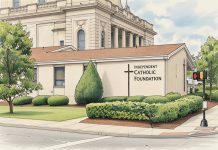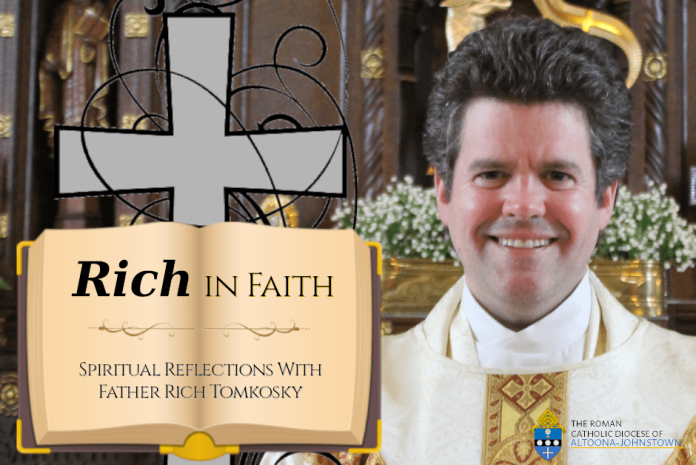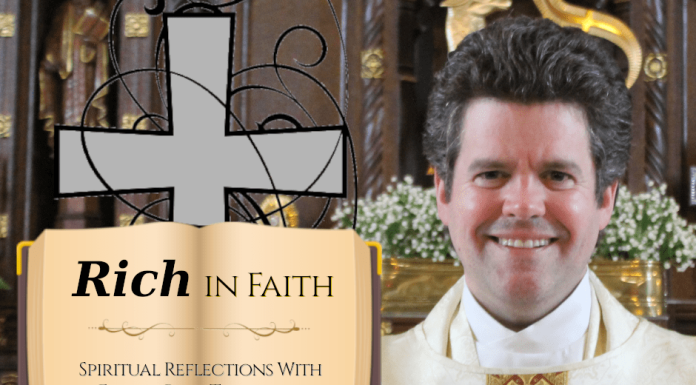By Father Rich Tomkosky
This past weekend, the Church celebrated World Mission Sunday. It was a reminder to us of the need to support the Missions both by our prayers and our generous financial support. We are all called to be home missionaries or sharers of the Good News of our Catholic faith daily with all those people we encounter.
Prayer is the foundation for all this, which means to have a living relationship with God the Father, Son and Holy Spirit. Prayer is not meant to be a monolog, but rather a dialog of love. It should help us take on the likeness of the living Lord.
But it is often a battle to persevere in prayer and not give up, especially when dealing with the difficulties of life: moments of sorrow and depression, the lost of a loved one, when our life plans don’t turn out like we anticipated, and just the daily grind of life, busyness and activities that wears us down at times, as well as the state of our contemporary world which to a great degree has lost a sense of God and morality based on our faith and love for Him – the Catholic vision of life and love.
Also, some ask why pray when God already knows what we need before we ask Him. Well, the great Saint Augustine gave the answer when he pointed out that God indeed knows what we need before we ask Him, but because we are called to be in a relationship of love with Him, when we pray, we “expand the desires of our hearts” to be more capable of receiving the graces the Lord wants to bestow on us. Like we need oxygen to breath on a physical level, we need to pray to both survive and hopefully thrive on a spiritual level.
I want to look at three types of prayer which are particularly helpful to grow in this loving relationship.
With the Sacred Scriptures
The Sacred Scriptures can give us wisdom for salvation through faith in Jesus Christ, and Scripture is inspired by God and is useful for teaching, for refutation, for correction, and for training in righteousness, so that one who belongs to God may be competent, equipped for every good work. Notice Sacred Scripture will not help us grow – unless we have faith in Jesus and we belong to God. If we treat the Bible simply as a piece of literature, it’s not going to help us that much.
Given that, people sometimes ask me where they should start in terms of praying with and studying the Sacred Scriptures, I recommend going through the four Gospels in a slow, prayerful, and deliberate way. Maybe a chapter a day. And then go from there to some of the other books of the Bible and pay attention to the footnotes.
People sometimes are afraid to read the Sacred Scriptures because they “might be led astray by their own thoughts.” Well, my response to that is: if you stay rooted in your Catholic faith that is unlikely to happen; this is also why it is so important to continue to study the Catholic faith on a regular basis – especially the Catechism of the Catholic Church.
Also, if you ever are perplexed by something in your prayerful reading of the Bible – please email or call me, if the need arises. I am not an expert myself on every technical Biblical question, but I at least know where to direct you if I don’t know the answer, in terms of good and holy Bible scholars and commentaries. It is worth the risk! Praying over the Sacred Scriptures is such a help in growing closer to the Lord.
With the Rosary and Divine Mercy Chaplet
I always encourage you to pray daily the Rosary and Divine Mercy Chaplet. Why? Well because I have found them so helpful in my own spiritual life and from the testimony of so many others as well. Both prayers draw us closer to the Lord if we have the proper dispositions when praying them: meaning that we ask the Holy Spirit to help us.
In the case of the Rosary, it is a special opportunity to pray in union with our Blessed Mother Mary, meditating on the mysteries of the life of her Son and Our Savior Jesus Christ from the moment of his conception until He returns to Heaven to prepare a place for us. The Our Father’s, Hail Mary’s, and Glory Be’s, help us in our mind and heart to enter the mystery we are pondering, reminding us that we are praying in company with Mary who is taking us by her loving hands to God: it is both a vocal and a meditative prayer leading to contemplative prayer.
Let’s be honest, at times it is difficult to pray the Rosary because we are distracted for any number of reasons but stick with it. Try to pray a set (five) of the mysteries daily, with your family if possible. The Rosary has been called a chain of divine life, and as many of the saints have pointed out that those who pray the Rosary regularly will stay close to the path of salvation over the course of their life and not be lost in the end; and that after the holy Mass it is the most powerful prayer with God.
The Chaplet of Divine Mercy is a newer prayer than the Rosary, taught by Jesus Himself to St. Faustina (see and read the Diary of Divine Mercy in My Soul), a religious sister in Poland back in the 1930’s. It is a very powerful prayer since it should lead us to call to mind the Sacred Passion of Jesus when we pray it and help us to enter into deeper union with Jesus through the Crosses of our own lives united with Him in this prayer.
As a spiritual tip, I find it helpful to meditate on the different sorrowful mysteries of our Lord’s life when praying the chaplet. It is a particularly effective prayer when offered for those who are dying, also for those who are living in serious sin and in need of repentance and finally to offer for the souls in Purgatory who are being purified of their sins before being invited by God into the perfect life of the blessed in Heaven, in adoration of the Blessed Trinity.
At Daily Mass and in quiet prayer, preferably before the Blessed Sacrament, if possible
Praying before Jesus in the Sacred Monstrance is very powerful. It concretely shows us that our Lord loves us so much that He wants to remain until the end of time with us in the reserved Blessed Sacrament in the Sacred Tabernacle. Eucharistic adoration truly shows the connection between the celebration of the Mass which is the Source and Summit of our faith and the reserved Blessed Sacrament which reminds us of the abiding presence of our Lord Jesus with His people.
Try to come to adoration when you are able – make it a priority in your life. Also remember to quietly pray with the Lord in your home, or in a walk in the woods, or somewhere you enjoy. Quiet prayer simply means loving our Beloved Lord and enjoying His presence in the silence of our hearts. Jesus gives a haunting thought (which my late friend, Father John Mark, and I were both struck by in seminary): When the Son of Many comes (back), will He find faith on earth? Kind of frightening, but if we are praying, He will in us. God bless you.
Father Rich Tomkosky is the Pastor of Saint Thomas the Apostle Parish in Bedford and the Pastor of Seven Dolors of the Blessed Virgin Mary Parish in Beans Cove.































